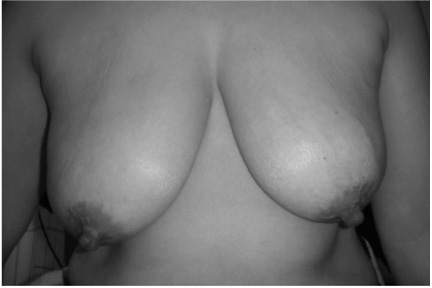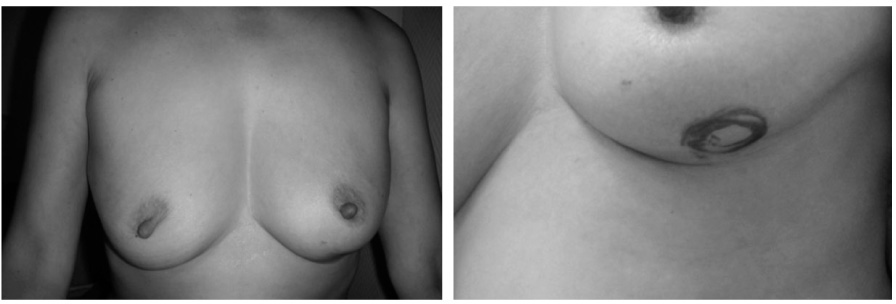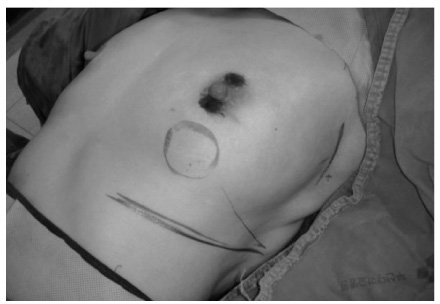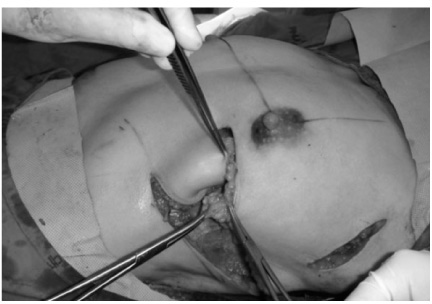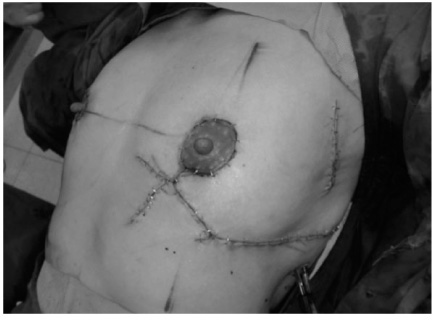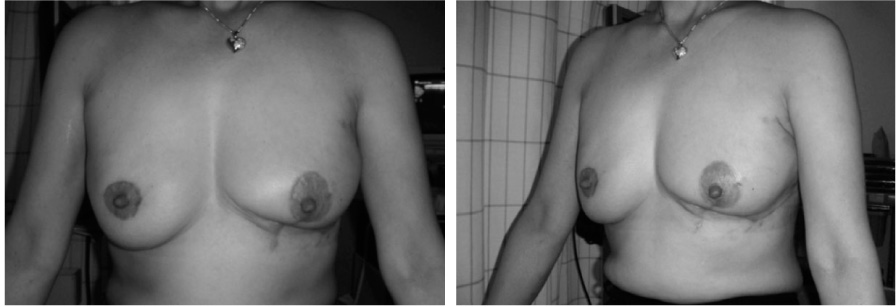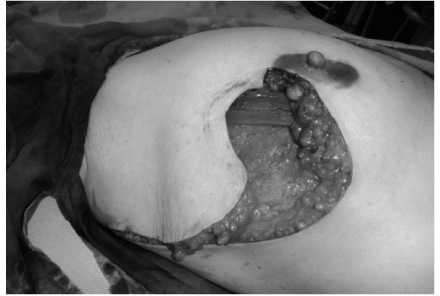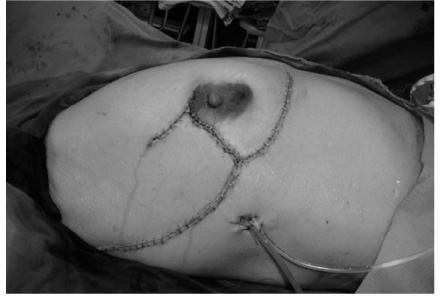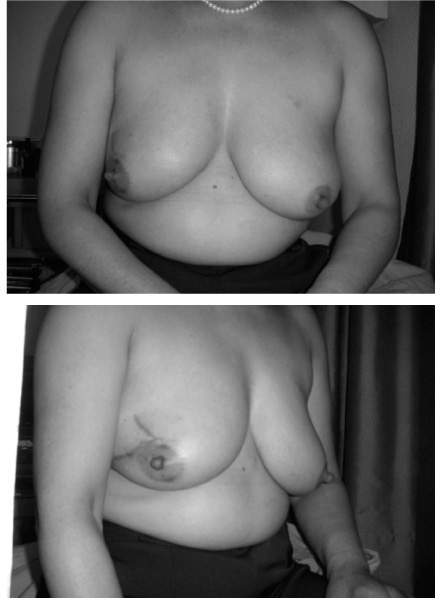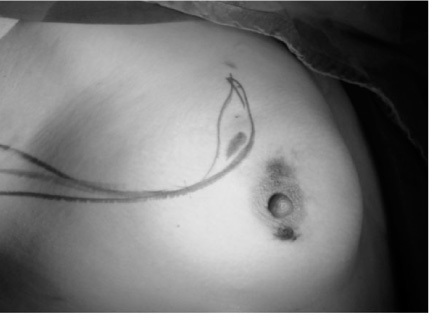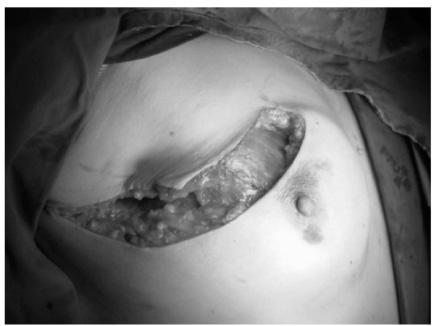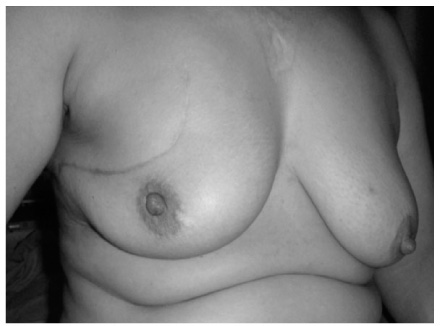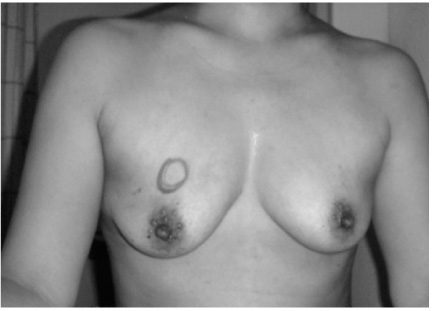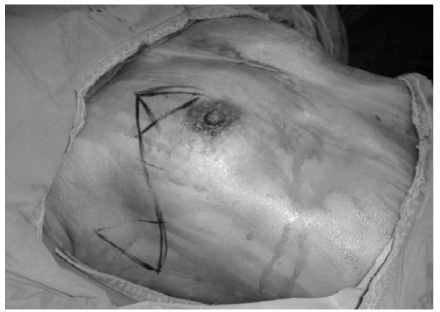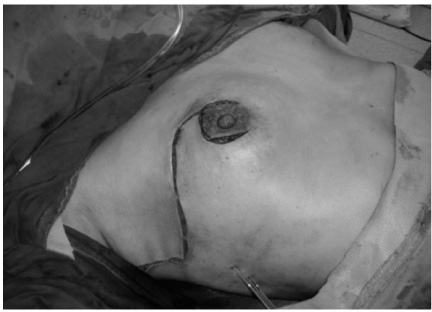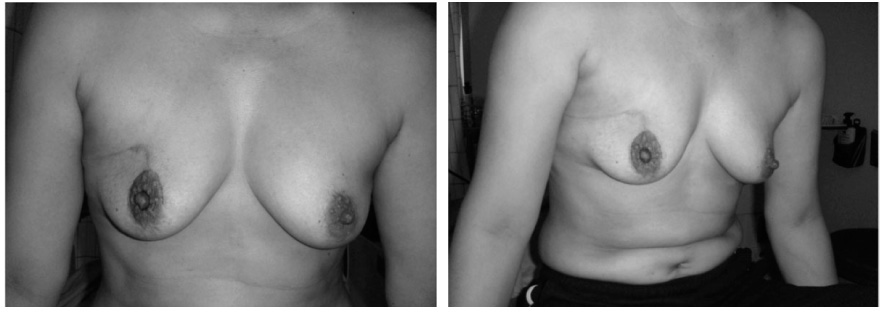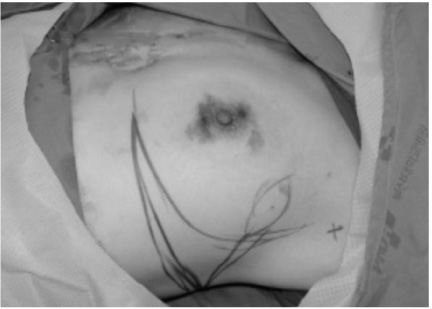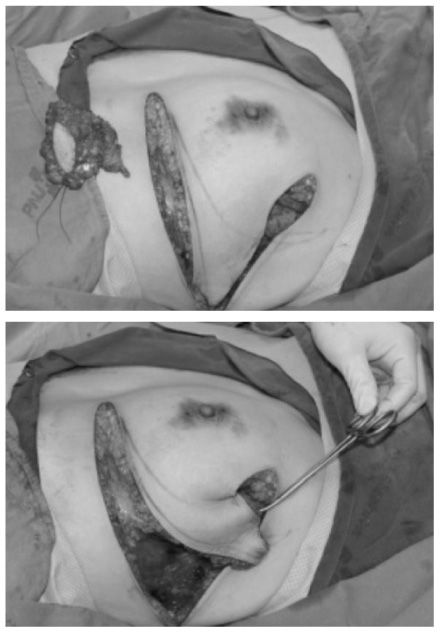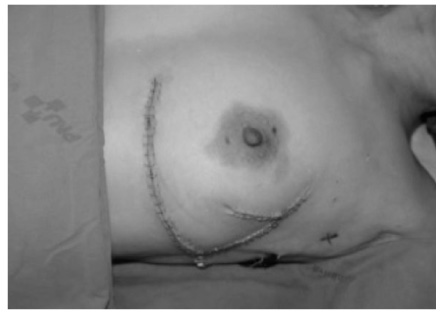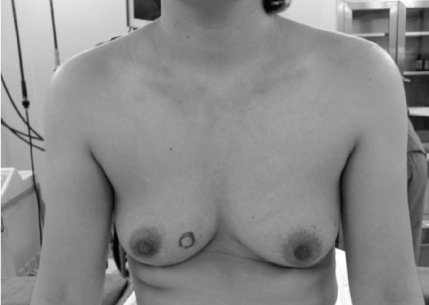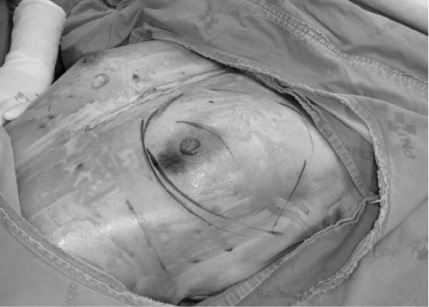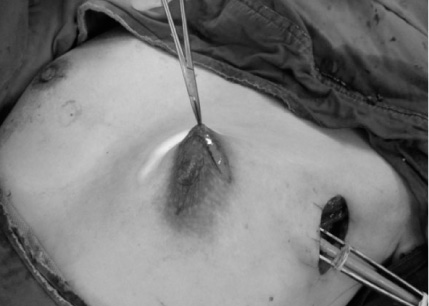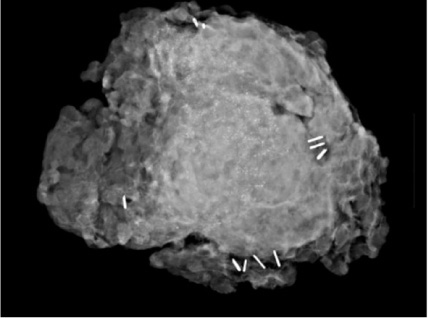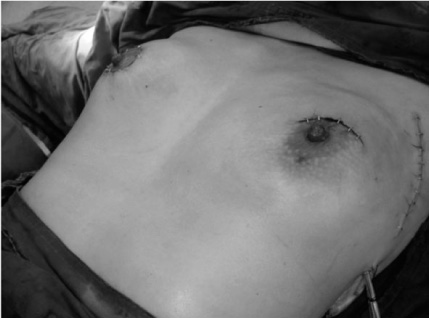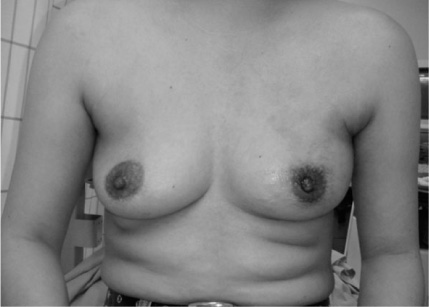J Korean Med Assoc.
2009 Oct;52(10):981-995. 10.5124/jkma.2009.52.10.981.
Oncoplastic Breast Surgery
- Affiliations
-
- 1Division of Breast Surgery, Pusan National University College of Medicine, Korea. bytae@pusan.ac.kr
- KMID: 2188080
- DOI: http://doi.org/10.5124/jkma.2009.52.10.981
Abstract
- For the majority of patients with breast cancer, a surgery that minimizes breast loss combined with radiotherapy has become a popular treatment of choice. The wider clearance margins are necessary for the lower risk of local recurrences, although the greater amount of breast tissue should be removed and the risk of deformation of the breast is higher. Satisfactory cosmetic results can be achieved by oncoplastic breast surgery. The aims of this paper are to review articles of oncoplastic surgery for breast cancer and to summarize the full range of immediate reconstructions from local flaps to sophisticated perforator flaps. It is important for a surgeon to minimize breast loss while the operation and maintain the patient's feeling that her breasts are still a part of her own body after the operation. The oncoplastic breast surgery will become an integral element of the surgical treatment of breast cancer in the future.
Keyword
MeSH Terms
Figure
Reference
-
1. Veronesi U, Cascinelli N, Mariani L, Greco M, Saccozzi R, Luini A, Aguilar M, Marubini E. Twenty-year follow-up of a randomized study comparing breast-conserving surgery with radical mastectomy for early breast cancer. N Engl J Med. 2002. 347:1227–1232.
Article2. Fisher B, Anderson S, Bryant J, Margolese RG, Deutsch M, Fisher ER, Jeong JH, Wolmark N. Twenty-year follow-up of a randomized trial comparing total mastectomy, lumpectomy, and lumpectomy plus irradiation for the treatment of invasive breast cancer. N Engl J Med. 2002. 347:1233–1241.
Article3. Whelan T, Levine M, Gafni A, Sanders K, Willan A, Mirsky D, Schnider D, McCready D, Reid S, Kobylecky A, Reed K. Mastectomy or lumpectomy? Helping women make informed choices. J Clin Oncol. 1999. 17:1727–1735.
Article4. Cutuli B, Cottu PH, Guastalla JP, Mechin H, Costa A, Jourdan R. A French national survey on infiltrating breast cancer: analysis of clinico-pathological features and treatment modalities in 1159 patients. Breast Cancer Res Treat. 2006. 95:55–64.
Article5. Ahn SH, Yoo KY. Chronological changes of clinical characteristics in 31,115 new breast cancer patients among Koreans during 1996-2004. Breast Cancer Res Treat. 2006. 99:209–214.
Article6. Veronesi U, Volterrani F, Luini A, Saccozzi R, Del Vecchio M, Zucali R, Galimberti V, Rasponi A, Di Re E, Squicciarini P. Quadrantectomy versus lumpectomy for small size breast cancer. Eur J Cancer. 1990. 26:671–673.
Article7. Clough KB, Cuminet J, Fitoussi A, Nos C, Mosseri V. Cosmetic sequelae after conservative treatment for breast cancer: classification and results of surgical correction. Ann Plast Surg. 1998. 41:471–481.
Article8. Clough KB, Nos C, Salmon RJ, Soussaline M, Durand JC. Conservative treatment of breast cancers by mammaplasty and irradiation: a new approach to lower quadrant tumors. Plast Reconstr Surg. 1995. 96:363–370.
Article9. Noguchi M, Saito Y, Mizukami Y, Nonomura A, Ohta N, Koyasaki N, Taniya T, Miyazaki I. Breast deformity, its correction, and assessment of breast conserving surgery. Breast Cancer Res Treat. 1991. 18:111–118.
Article10. Cochrane RA, Valasiadou P, Wilson AR, Al-Ghazal SK, Macmillan RD. Cosmesis and satisfaction after breast-conserving surgery correlates with the percentage of breast volume excised. Br J Surg. 2003. 90:1505–1509.
Article11. Al-Ghazal SK, Fallowfield L, Blamey RW. Does cosmetic outcome from treatment of primary breast cancer influence psychosocial morbidity? Eur J Surg Oncol. 1999. 25:571–573.
Article12. Clough KB, Lewis JS, Couturaud B, Fitoussi A, Nos C, Falcou MC. Oncoplastic techniques allow extensive resections for breast-conserving therapy of breast carcinomas. Ann Surg. 2003. 237:26–34.
Article13. Rutgers EJ. Guidelines to assure quality in breast cancer surgery. Eur J Surg Oncol. 2005. 31:568–576.
Article14. Audretsch W. Spear SL, editor. Reconstruction of the partial mastectomy defect: classification and method. Surgery of the Breast: Principles and Art. 1998. 1th ed. Philadelphia: Lippincott-Raven;155–196.15. Malycha PL, Gough IR, Margaritoni M, Deo SV, Sandelin K, Buccimazza I, Agarwal G. Oncoplastic breast surgery: a global perspective on practice, availability, and training. World J Surg. 2008. 32:2570–2577.
Article16. Baildam AD. Oncoplastic surgery of the breast. Br J Surg. 2002. 89:532–533.
Article17. Skillman JM, Humzah MD. The future of breast surgery: a new subspecialty of oncoplastic breast surgeons? Breast. 2003. 12:161–162.
Article18. Raja MA, Straker VF, Rainsbury RM. Extending the role of breast-conserving surgery by immediate volume replacement. Br J Surg. 1997. 84:101–105.
Article19. Giacalone PL, Roger P, Dubon O, El Gareh N, Daures JP, Laffargue F. Lumpectomy vs oncoplastic surgery for breast-conserving therapy of cancer. A prospective study about 99 patients. Ann Chir. 2006. 131:256–261.20. Baildam A, Bishop H, Boland G, Dalglish M, Davies L, Fatah F, Gooch H, Harcourt D, Martin L, Rainsbury D, Rayter Z, Sheppard C, Smith J, Weiler-Mithoff E, Winstanley J, Church J. Oncoplastic breast surgery-a guide to good practice. Eur J Surg Oncol. 2007. 33:1–23.21. Brandberg Y, Malm M, Blomqvist L. A prospective and randomized study, "SVEA", comparing effects of three methods for delayed breast reconstruction on quality of life, patient-defined problem areas of life, and cosmetic result. Plast Reconstr Surg. 2000. 105:66–76.
Article22. Schain WS, Wellisch DK, Pasnau RO, Landsverk J. The sooner the better: a study of psychological factors in women undergoing immediate versus delayed breast reconstruction. Am J Psychiatry. 1985. 142:40–46.
Article23. Schain WS, Jacobs E, Wellisch DK. Psychosocial issues in breast reconstruction. Intrapsychic, interpersonal, and practical concerns. Clin Plast Surg. 1984. 11:237–251.24. Al-Ghazal SK, Fallowfield L, Blamey RW. Comparison of psychological aspects and patient satisfaction following breast conserving surgery, simple mastectomy and breast reconstruction. Eur J Cancer. 2000. 36:1938–1943.
Article25. Al-Ghazal SK, Sully L, Fallowfield L, Blamey RW. The psychological impact of immediate rather than delayed breast reconstruction. Eur J Surg Oncol. 2000. 26:17–19.
Article26. Dean C, Chetty U, Forrest AP. Effects of immediate breast reconstruction on psychosocial morbidity after mastectomy. Lancet. 1983. 1:459–462.
Article27. Kroll SS, Ames F, Singletary SE, Schusterman MA. The oncologic risks of skin preservation at mastectomy when combined with immediate reconstruction of the breast. Surg Gynecol Obstet. 1991. 172:17–20.28. Singletary SE. Skin-sparing mastectomy with immediate breast reconstruction: the M.D. Anderson Cancer Center experience. Ann Surg Oncol. 1996. 3:411–416.
Article29. Chevray PM, Robb GL. Hunt KK, Robb GL, Strom EA, Ueno NT, editors. Breast reconstruction. M.D. Anderson Cancer Care Series Breast Cancer. 2008. 2nd ed. New York: Springer Sience;235–269.
Article30. Clough KB, Kroll SS, Audretsch W. An approach to the repair of partial mastectomy defects. Plast Reconstr Surg. 1999. 104:409–420.
Article31. Slavin SA, Love SM, Sadowsky NL. Reconstruction of the radiated partial mastectomy defect with autogenous tissues. Plast Reconstr Surg. 1992. 90:854–868.
Article32. Kroll SS, Singletary SE. Repair of partial mastectomy defects. Clin Plast Surg. 1998. 25:303–310.
Article33. Losken A, Styblo TM, Carlson GW, Jones GE, Amerson BJ. Management algorithm and outcome evaluation of partial mastectomy defects treated using reduction or mastopexy techniques. Ann Plast Surg. 2007. 59:235–242.
Article34. Garusi C, Petit JY, Rietjens M, Lanfrey E. Role of plastic surgery in the conservative treatment of breast cancer. Ann Chir Plast Esthet. 1997. 42:168–176.35. Boice JD Jr, Persson I, Brinton LA, Hober M, McLaughlin JK, Blot WJ, Fraumeni JF Jr, Nyren O. Breast cancer following breast reduction surgery in Sweden. Plast Reconstr Surg. 2000. 106:755–762.
Article36. Fryzek JP, Ye W, Nyren O, Tarone RE, Lipworth L, Mc-Laughlin JK. A nationwide epidemiologic study of breast cancer incidence following breast reduction surgery in a large cohort of Swedish women. Breast Cancer Res Treat. 2006. 97:131–134.
Article37. Losken A, Elwood ET, Styblo TM, Bostwick J 3rd. The role of reduction mammaplasty in reconstructing partial mastectomy defects. Plast Reconstr Surg. 2002. 109:968–977.
Article38. Smith ML, Evans GR, Gurlek A, Bouvet M, Singletary SE, Ames FC, Janjan N, McNeese MD. Reduction mammaplasty: its role in breast conservation surgery for early-stage breast cancer. Ann Plast Surg. 1998. 41:234–239.39. Fajardo LL, Bessen SC. Epidermal inclusion cyst after reduction mammoplasty. Radiology. 1993. 186:103–106.
Article40. Rainsbury RM, Paramanathan N. Recent Progress with Breast-Conserving Volume Replacement Using Latissimus Dorsi Miniflaps in UK Patients. Breast Cancer. 1998. 5:139–147.
Article41. Dixon JM, Venizelos B, Chan P. Latissimus dorsi mini-flap: a technique for extending breast conservation. Breast. 2002. 11:58–65.
Article42. Kijima Y, Yoshinaka H, Owaki T, Funasako Y, Aikou T. Immediate reconstruction using inframammary adipofascial flap of the anterior rectus sheath after partial mastectomy. Am J Surg. 2007. 193:789–791.
Article43. Audretsch W. Spear SL, editor. Reconstruction of the partial mastectomy defect: classification and method. Surgery of the Breast: Principles and Art. 2006. 2nd ed. Philadelphia: Lippincott Willium and Wilkins;198–216.44. Holmstrom H, Lossing C. The lateral thoracodorsal flap in breast reconstruction. Plast Reconstr Surg. 1986. 77:933–943.
Article45. Koh SH, Seo HI, Bae YT. Immediate conservative breast reconstruction technique using lateral thoracodorsal fasciocutaneous Flap. J Br Cancer. 2007. 10:217–222.
Article46. Tansini I. Nuovo processo per l'amputazione della mamella per cancre. Riforma Med. 1896. 12:3–5.47. Olivari N. The latissimus flap. Br J Plast Surg. 1976. 29:126–128.
Article48. Page DL, Johnson JE. Controversies in the local management of invasive and non-invasive breast cancer. Cancer Lett. 1995. 90:91–96.
Article49. Noguchi M, Taniya T, Miyazaki I, Saito Y. Immediate transposition of a latissimus dorsi muscle for correcting a post-quadrantectomy breast deformity in Japanese patients. Int Surg. 1990. 75:166–170.50. Tomita K, Yano K, Matsuda K, Takada A, Hosokawa K. Esthetic outcome of immediate reconstruction with latissimus dorsi myocutaneous flap after breast-conservative surgery and skin-sparing mastectomy. Ann Plast Surg. 2008. 61:19–23.
Article51. Toth BA, Lappert P. Modified skin incisions for mastectomy: the need for plastic surgical input in preoperative planning. Plast Reconstr Surg. 1991. 87:1048. 1053.52. Gerber B, Krause A, Dieterich M, Kundt G, Reimer T. The oncological safety of skin sparing mastectomy with conservation of the nipple-areola complex and autologous reconstruction: an extended follow-up study. Ann Sur. 2009. 249:461–468.
Article53. Hodgson EL, Malata CM. Implant-based breast reconstruction following mastectomy. Breast Dis. 2002. 16:47–63.54. Henriksen TF, Fryzek JP, Holmich LR, McLaughlin JK, Krag C, Karlsen R, Kjoller K, Olsen JH, Friis S. Reconstructive breast implantation after mastectomy for breast cancer: clinical outcomes in a nationwide prospective cohort study. Arch Surg. 2005. 140:1152–1161.
Article55. Contant CM, van Geel AN, van der Holt B, Griep C, Tjong Joe Wai R, Wiggers T. Morbidity of immediate breast reconstruction (IBR) after mastectomy by a subpectorally placed silicone prosthesis: the adverse effect of radiotherapy. Eur J Surg Oncol. 2000. 26:344–350.
Article56. Vandeweyer E, Deraemaecker R. Radiation therapy after immediate breast reconstruction with implants. Plast Reconstr Surg. 2000. 106:56–60.
Article57. Bostwick J 3rd, Scheflan M. The latissimus dorsi musculocutaneous flap: a one-stage breast reconstruction. Clin Plast Surg. 1980. 7:71–78.
Article58. McCraw JB, Maxwell GP. Early and late capsular "deformation" as a cause of unsatisfactory results in the latissimus dorsi breast reconstruction. Clin Plast Surg. 1988. 15:717–726.
Article59. Tschopp H. Evaluation of long-term results in breast reconstruction using the latissimus dorsi flap. Ann Plast Surg. 1991. 26:328–340.
Article60. Paepke S, Schmid R, Fleckner S, Paepke D, Niemeyer M, Schmalfeldt B, Jacobs VR, Kiechle M. Subcutaneous mastectomy with conservation of the nipple-areola skin: broadening the indications. Ann Surg. 2009. 250:288–292.61. Tarantino I, Banic A, Fischer T. Evaluation of late results in breast reconstruction by latissimus dorsi flap and prosthesis implantation. Plast Reconstr Surg. 2006. 117:1387–1394.
Article62. Schneider WJ, Hill HL Jr, Brown RG. Latissimus dorsi myocutaneous flap for breast reconstruction. Br J Plast Surg. 1977. 30:277–281.
Article63. Erdmann D, Sundin BM, Moquin KJ, Young H, Georgiade GS. Delay in unipedicled TRAM flap reconstruction of the breast: a review of 76 consecutive cases. Plast Reconstr Surg. 2002. 110:762–767.
Article64. Hartrampf CR, Scheflan M, Black PW. Breast reconstruction with a transverse abdominal island flap. Plast Reconstr Surg. 1982. 69:216. 225.
Article65. Holmstrom H. The free abdominoplasty flap and its use in breast reconstruction. An experimental study and clinical case report. Scand J Plast Reconstr Surg. 1979. 13:423–427.
Article66. Larson DL, Yousif NJ, Sinha RK, Latoni J, Korkos TG. A comparison of pedicled and free TRAM flaps for breast reconstruction in a single institution. Plast Reconstr Surg. 1999. 104:674–680.
Article67. Kroll SS, Gherardini G, Martin JE, Reece GP, Miller MJ, Evans GR, Robb GL, Wang BG. Fat necrosis in free and pedicled TRAM flaps. Plast Reconstr Surg. 1998. 102:1502–1507.
Article68. Nahabedian MY, Manson PN. Contour abnormalities of the abdomen after transverse rectus abdominis muscle flap breast reconstruction: a multifactorial analysis. Plast Reconstr Sur. 2002. 109:81–90.69. Allen RJ, Treece P. Deep inferior epigastric perforator flap for breast reconstruction. Ann Plast Surg. 1994. 32:32–38.
Article70. Blondeel PN. One hundred free DIEP flap breast reconstructions: a personal experience. Br J Plast Surg. 1999. 52:104–111.
Article71. Bajaj AK, Chevray PM, Chang DW. Comparison of donor-site complications and functional outcomes in free muscle-sparing TRAM flap and free DIEP flap breast reconstruction. Plast Reconstr Surg. 2006. 117:737–750.
Article72. Grotting JC. The free abdominoplasty flap for immediate breast reconstruction. Ann Plast Surg. 1991. 27:351–354.
Article73. Chevray PM. Breast reconstruction with superficial inferior epigastric artery flaps: a prospective comparison with TRAM and DIEP flaps. Plast Reconstr Surg. 2004. 114:1077–1085.
Article74. Allen RJ, Tucker C Jr. Superior gluteal artery perforator free flap for breast reconstruction. Plast Reconstr Surg. 1995. 95:1207–1212.
Article75. Paletta CE, Bostwick J 3rd, Nahai F. The inferior gluteal free flap in breast reconstruction. Plast Reconstr Surg. 1989. 84:875–885.
Article76. Harii K, Ohmori K, Sekiguchi J. The free musculocutaneous flap. Plast Reconstr Surg. 1976. 57:294–303.
Article77. Arnez ZM, Pogorelec D, Planinsek F, Ahcan U. Breast reconstruction by the free transverse gracilis (TUG) flap. Br J Plast Surg. 2004. 57:20–26.
Article
- Full Text Links
- Actions
-
Cited
- CITED
-
- Close
- Share
- Similar articles
-
- Oncoplastic Surgical Techniques for Personalized Breast Conserving Surgery in Breast Cancer Patient with Small to Moderate Sized Breast
- Evolving Trends in Breast Surgery: Oncoplastic to Onco-Aesthetic Surgery
- Response to Letter: Evolving Trends in Breast Surgery: Oncoplastic to Onco-Aesthetic Surgery
- Oncoplastic Techniques For Treatment of Inferiorly Located Breast Cancer
- Surgical Techniques for Personalized Oncoplastic Surgery in Breast Cancer Patients with Small- to Moderate-Sized Breasts (Part 1): Volume Displacement

